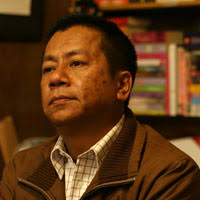In this post, notes of “Unit 2: D(i) The Strange Affair of Robin S. Ngangom” from “DSC- 11: Indian Writing in English” are given which is helpful for the students doing graduation this year.
Introduction to Robin S. Ngangom’s Life and Works

Robin S. Ngangom is a well-known poet and writer from Manipur, a state in northeastern India. He was born in 1959 and is recognized as one of the important voices in modern Indian English poetry. His writing often touches on deep human feelings and comments on social and political issues. Ngangom’s poems look at the lives of marginalized groups, identity, and the struggles of living in a place like Manipur, which has faced political problems for many years.
Some of his poetry books include Words in the Dusk (1988), A Time to Change (2000), and The Descent of the River (2011). In his poems, he connects personal feelings with shared histories, discussing themes like displacement, survival, and strength. His writing is influenced by the political and cultural changes happening around him, especially in Manipur.
Historical and Cultural Context of His Poetry
Ngangom’s poetry is shaped by the ongoing struggles and political issues in Manipur. The state has faced violence and instability for many years. His writing shows the pain and complicated realities of living in such a situation. The diverse culture of Manipur, which includes local traditions and the effects of colonial history, also impacts his themes and style.
During Ngangom’s childhood, Manipur experienced serious political issues, including the Armed Forces Special Powers Act (AFSPA) and human rights abuses. These events have influenced his views and the themes of violence and trauma in his poetry. His work speaks to the experiences of people affected by conflict and reflects on broader human experiences.
Themes and Motifs in Ngangom’s Poetry
Ngangom’s poetry mixes personal thoughts with social and political issues. Some main themes in his work include:
- Conflict and Displacement: Growing up in a troubled region, themes of loss and the effects of violence are common in his poems. He often writes about the emotional and physical challenges of living in a conflict zone.
- Identity and Cultural Struggles: As a poet from Manipur, Ngangom looks at the clash between local identity and the broader Indian story. He explores ethnicity, tradition, and how local cultures survive against outside influences.
- Memory and History: Memory plays a big role in Ngangom’s poetry. He reflects on personal and shared histories, showing how people deal with the past, especially after violence and loss.
- Nature and the Environment: Nature is often a part of Ngangom’s poetry, serving as both a metaphor and a real presence. The natural world symbolizes change and stability, providing moments of peace amid chaos.
- Alienation and Isolation: His poems often express the loneliness felt by people in conflict. Living in a violent environment leads to feelings of disconnection, a common theme in his work.
- Hope and Resistance: Even when discussing difficult subjects, Ngangom’s poetry includes themes of hope and strength. He writes about the resilience of the human spirit and the fight for justice and peace.
In summary, Robin S. Ngangom’s poetry gives a close look at the lives of people in a region filled with struggle and resilience. His deep connection to the social issues of Manipur, along with his sensitivity to themes of identity and memory, makes his work a reflection on the human experience.
The Strange Affair of Robin S. Ngangom
The Strange Affair of Robin S. Ngangom Summary
Read Full Poem: The Strange Affair of Robin S. Ngangom
“The Strange Affair of Robin S. Ngangom” is a poem by Robin S. Ngangom that talks about his identity and how he sees himself in relation to his culture. The poem tells a story where the poet shares his thoughts and feelings, mixing his personal experiences with larger ideas about identity.
The title, “The Strange Affair,” suggests that the poet’s relationship with the world is confusing and complicated. The poem goes beyond Ngangom’s personal story, exploring the challenges of belonging, especially in a place with cultural and political struggles. There is irony in how he feels torn between his home culture and the wider Indian identity.
As the poem continues, Ngangom thinks about how others see him and how he sees himself. The “strange affair” represents the idea that identity can be broken and changeable, influenced by outside views, especially in a politically and culturally tense world. Ngangom questions what his true identity is and how he fits into what society expects of him.
Key Themes: Identity, Self-Reflection, and Cultural Heritage
- Identity: A main theme of the poem is identity, particularly how it can be complicated in a troubled environment. Ngangom shows that identity is not fixed but constantly shaped by outside influences like politics and history. He reflects on being part of both Manipur’s local culture and the wider Indian society, highlighting the struggle between local and national identity.
- Self-Reflection: Throughout the poem, Ngangom looks deeply into himself, considering his role in the world, how others see him, and whether he understands himself. He raises questions about his existence, dealing with complex issues that are not just personal but also political, shaped by colonialism and regional conflicts.
- Cultural Heritage: The poem also explores cultural heritage, focusing on the impact of displacement and conflict. Ngangom’s examination of his cultural background shows the importance of tradition, while also recognizing how modern challenges can change or weaken these traditions. The tension between keeping cultural heritage and adapting to outside pressures adds to his feelings of being lost.
Literary Devices and Techniques
- Irony: Irony is a key part of the poem, as Ngangom presents a story that contrasts with itself. The title suggests something unusual, setting up the poem’s ironic look at identity. The poet feels caught between different identities and his wish to be true to himself. There is a gap between how he sees himself and how others see him, especially in a troubled society.
- Imagery: Ngangom uses strong images to express his feelings. The vivid pictures he paints evoke emotions and show his struggles. The imagery of displacement and conflict reflects his personal journey and the harsh realities of living in a troubled area.
- Narrative Style: The poem’s storytelling style is introspective and thoughtful, flowing naturally like a stream of consciousness. Ngangom’s thoughts unfold without strict structure, matching the complexity of identity and self-perception. This style creates an intimate feel, drawing readers into his inner world.
Significance and Relevance of the Poem
“The Strange Affair of Robin S. Ngangom” is important in today’s discussions about identity, especially in postcolonial settings where belonging and cultural heritage can be challenging. The poem shows how people navigate different identities, highlighting the struggle between local and national identity.
Ngangom’s poem speaks to the feelings of isolation faced by individuals in conflict areas or marginalized communities. It resonates with readers from regions dealing with their own identity struggles. The themes of self-reflection and identity are relevant to everyone, encouraging readers to think about their own identities in relation to society.
Additionally, Ngangom addresses the issue of preserving culture against outside pressures, whether from colonial powers or globalization. In an age where cultural traditions are often at risk, the poet’s thoughts urge us to consider what is lost and what remains in shaping identity.
In summary, “The Strange Affair of Robin S. Ngangom” is a deep poem that explores important themes of identity, cultural heritage, and self-reflection. Through irony, vivid imagery, and a reflective style, Ngangom examines his own life while also addressing broader experiences of those affected by conflict and cultural change.


